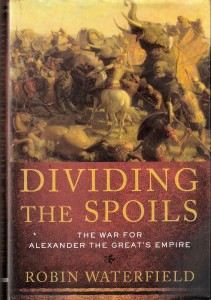Dividing the Spoils
http://www.goodreads.com/book/show/15925372-dividing-the-spoils
Dividing the Spoils: The War for Alexander the Great’s Empire: by Robin Waterfield
Dividing the Spoils
This book filled a yawning gap in my knowledge of the period between Alexander’s defeat of the Persians in 333 BCE, and the essentially Judea-centric history of the 2nd century BCE – the Ptolemies and the Seleucids, and the oppression by the latter of the Judean religion, leading to the Maccabean revolt in 167 BCE. Of course one knew the bare outlines; that Alexander had died in 323 having just completed his conquest of India, and that his generals then fought it out to decide who was getting what. I did not even realize that the word Diadokhoi meant successors; I thought it was something to do with there being twelve of them. Somehow or other, I knew, Ptolemy ended up with Egypt, and Seleucus with Syria and Babylonia, – but the rest ? I had heard of the one-eyed Antigonus who seemed to have ruled in Asia Minor, but Greece, Macedon, Cyprus, etc were unknowns until the Romans showed up in the second century BCE.
The second function of this book was to dispel any romantic illusions – good history usually does that – about Alexander, this young king who created the first true world-spanning empire, and then died before he could enjoy it – “those whom the gods love..” etc. He was a formidable general and his record of conquest is true; but conquest was all it was; he had not created anything like an empire out of it – which was why it was so easily torn apart once he was gone (it might have done so any way even if he had lived – which would have somewhat spoiled his story). Alexander – like most of his contemporaries – was hard drinking (which may have contributed to his untimely demise) and, by modern standards, cruel and treacherous. He would think nothing of having a friend or ally killed, if it served his purpose or represented any potential competition to his dominance. He had adopted the Eastern style of an absolute ruler, rather than the more ostensibly collegial Greek/Macedonian style.
Alexander’s plans for the future – inso far as they are known to history – involved only more conquest ; his goals – and those of his successors – did not encompass the “spread of Greek/Hellenistic culture” around the world. The fact that that happened in the years after his death was an unintended consequence of there being so many Greek and Macedonian soldiers – together with their wives and children – scattered around the world between the Aegean and India. Initially, they were there as part of conquering armies, and to man garrisons; then they stayed and peopled the cities that these garrisons became. These colonialists spoke their own language, imported their own architecture, their gymnasia and theater, etc because they wanted to feel at home away from home. Nothing was intended for the benefit of the locals; however, inevitably over time, there was a trickle-down effect, and the process we know as Hellenization was underway.
This book pauses periodically from its main theme, the 40 years of war that followed Alexander’s death, to insert a number of parenthetic commentaries on important societal, religious and cultural trends – such as the spread of Hellenism – that occurred during the period. Not only do they make for a very welcome break from this account of unbridled ambition, treachery and slaughter, but they are highly informative and insightful. For example, I had unquestionably accepted the proposition that it was the Greeks who had introduced the emphasis on individualism into the East, which led to the development of the idea of the immortality of the soul, and caused changes in burial practice among Jews. I learned here that individualism was not a concept of Classical Greece, which emphasized the collegial nature of civic endeavour. It was only – post Alexander – when previously independent city-states became absorbed in kingdoms or empires, and the local citizenry lost control of their own polities, that the emphasis – in art, statuary, drama and in religion – shifted away from the communal to the individual.
As for the main theme itself – the 6 wars that were waged during this period – the author deals with these in a very engaging and direct fashion. The names – of places and protagonists – and the relationships between them, are bewildering; the author provides a good set of maps and a list of the dramatis personae; reference to these while reading is essential, if the reader wants to make any sense of the various twists and turns of the plot. So, as well as an informative and enjoyable reading experience, this is also a valuable reference book.


